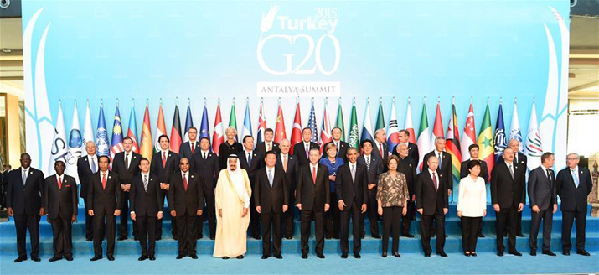Antalya summit brings new hope for world economy
- By Zhang Jingwei
 0 Comment(s)
0 Comment(s) Print
Print E-mail China.org.cn, November 18, 2015
E-mail China.org.cn, November 18, 2015
|
|
|
Chinese President Xi Jinping (seventh from left) and other leaders attending the 10th summit of the Group of Twenty (G20) major economies pose for photos in Antalya, Turkey, on November 15 [Xinhua] |
On Nov. 15-16, the Group of Twenty (G20) economies held their 10th summit in the Mediterranean coastal city of Antalya in southwest Turkey.
The deadly terrorist attacks in Paris did cast a deep shadow over the meeting. French President Fran?ois Hollande cancelled his flight to Antalya, while the anti-terrorism fight became an inevitable topic during the meeting.
However, a G20 meeting is still an economic forum. With the theme of "collective action for inclusive and robust growth," the requirement for the Antalya summit was to promote global economic growth, strengthen economic governance, and speed up economic reform and transformation, to realize real recovery of the global economy.
G20 summit is a systematic product for dealing with global economic crises. In November 2008, the first G20 summit in the United States opened a new chapter for the world order. Indian Prime Minister Dr. Manmohan Singh welcomed the summit, saying: "For the first time there is genuine dialogue between many of the developed countries and the emerging economies."
In April 2009, the second G20 summit was held in London. As Europe was gripped by sovereign debt crises, emerging economies started to play a more important role.
In recent years, BRICS (Brazil, Russia, India, China and South Africa) countries have improved their status in global economic governance. In 2010, the International Monetary Fund (IMF) approved far-reaching reforms to give more voting powers to dynamic emerging markets and developing countries.
After several rounds of the quantitative easing (QE) program the American economy began to recover. The Western countries seem to regain their confidence and thus unwilling to admit the importance of emerging economies. Over the past five years, the U.S. Congress has suspended the IMF reform proposals agreed by G20 in 2010.
Currently, the global economy is yet to recover. The United States has not been confident enough to normalize its monetary policy -- the Federal Reserve (Fed) is expected to raise interest rates in December. The European and Japanese economies still rely on QE to stimulate their economic vitality. The Chinese economy has moved into a slower economic growth, while other emerging economies are suffering from low prices of energy commodities.
During the period of last G20 summit to this year's meeting, the world market had to struggle through its most worrying time. In 2015, the global economy was expected to recover, being driven by the American economy; however, it hasn't happened. The IMF summarizes the 2015 global economy as approaching closer to a "new mediocre" scenario.




Go to Forum >>0 Comment(s)